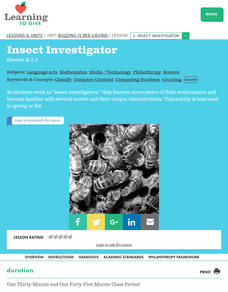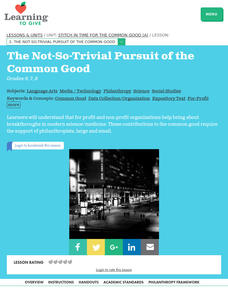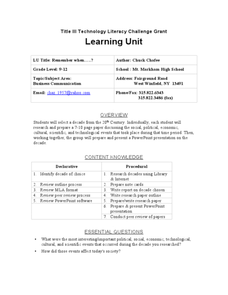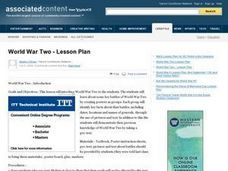Curated OER
Music Motivates
Middle schoolers listen to songs from the Civil Rights movement. They explain how the music might have inspired African-Americans to be activists in the movement. They examine how the Civil Rights movement affected the common good.
Curated OER
The Mayflower Compact Started It
Students examine the role the Mayflower Compact had in aiding the common good. They analyze the importance of the Compact and what affect it had on the colony. They write a paper summarizing how they interpreted the Compact itself.
Curated OER
Using Our Talents for the Common Good LESSON 2: How Can Our Talents Be Used Together?
Students decide what talents are and how they can be used to help others. They recite a poem and write journal entries about using their talents.
Curated OER
Sectors? What Sectors?
Middle schoolers develop a list why water is an endangered natural resource. They identify four sectors in society. They explain the responsibilities that each sector plays in conserving water.
Curated OER
Insect Investigator
Young scholars examine and identify common insects. They observe these insects in their environment and keep track of how many they see. They use magnifying glasses and special hats to get into the role of an inspector.
Curated OER
The Not-So-Trivial Pursuit of the Common Good
Students practice using vocabulary associated with philantrophy. They identify scientific breakthroughs and the funding that made it possible. They create and explain timelines of scientific and medical breakthroughs.
Curated OER
Lewis and Clark: Great Journey West
Students view a movie about Lewis and Clark's expedition out west. They examine how Native Americans helped them on their journey. They choose a Native American to research and present their findings to the class.
Curated OER
Projecting the Image -- What Can One Person Do?
Students research individuals who have received the Nobel Peace Prize. They identify the importance of their actions for the common good. They make note of their background, motivations and values.
Curated OER
Memories
Fifth graders collect artifacts of their fifth grade school year and make a technology based Memory Book.
Curated OER
Geo Jammin' By DeSign - Day 2, Lesson 9: Bringing It To A Fine Gloss-ary
Students create a glossary of geometric terms while exploring tangram manipulatives.
Curated OER
SAMMY DISCOVERS SHAPES AT SCHOOL
Pupils study maps and use them for real world experiences.
Curated OER
Weather Records
Students write newspaper articles using a "weather record" worksheet and information they find in newspapers.
Curated OER
Sadorus Photograph Collection Activity: Analysis of an Historical Photograph
Young scholars retrive social, cultural, and historical information from a photograph by analyzing the contents. Data about the subject's culture, people, events, and place is explored.
Curated OER
Remember When?
Students work in cooperative groups to research life in a decade of the 20th century. Each group member writes a 7-10 page paper highlighting the social, political and cultural events and the group presents a Powerpoint presentation to...
Curated OER
Home of Franklin Delano Roosevelt National Historic Site
Students examine some early activities and circumstances of Franklin Roosevelt's life and demonstrate how those activities may have influenced his policies and decisions in public life. Structures in their own community created by the...
Curated OER
Learning from Primary Source Documents One Day at a Time
Students differentiate between primary and secondary research sources before making a visual representation of their research into the colonist of Fort St. Louis. They write inquiry questions to guide their research.
Curated OER
Philanthropic Literature: Give a cookie
Students read a book to discover the importance of sharing. They predict what will happen in the story. Students use manipulatives to model the story problem. Students follow instructions, measure ingredients, and make cookies.
Curated OER
Curious About Creepy Crawlies?
Students create oral presentations and visual aids to assist their inquiry about various insects. They reflect on the importance of learning about insects while working in small groups.
Curated OER
Bioluminescent Bewilderment!
Ninth graders investigate the concept of bioluminescent. They break down the word phonetically for correct pronunciation. This is done as a warm up for learning. Then students create a list of the creatures from prior knowledge and...
Curated OER
World War II
High schoolers create a Powerpoint presentation covering key information regarding a World War II battle and present the information to the class in the form of an oral presentation. They then will turn in a summary report including two...
Curated OER
Minneapolis and St. Paul PowerPoint
Students examine the development of Minneapolis and St. Paul. As a class, they watch a PowerPoint presentation on the placement of cities in relationship to water. For each slide, they must answer the questions correctly to move on.
Curated OER
Meeting our Basic Needs
Young scholars brainstorm the basic needs of the community and create a chart. In this volunteerism instructional activity, students recognize people in the community who have given charity in the community. Young scholars read...























